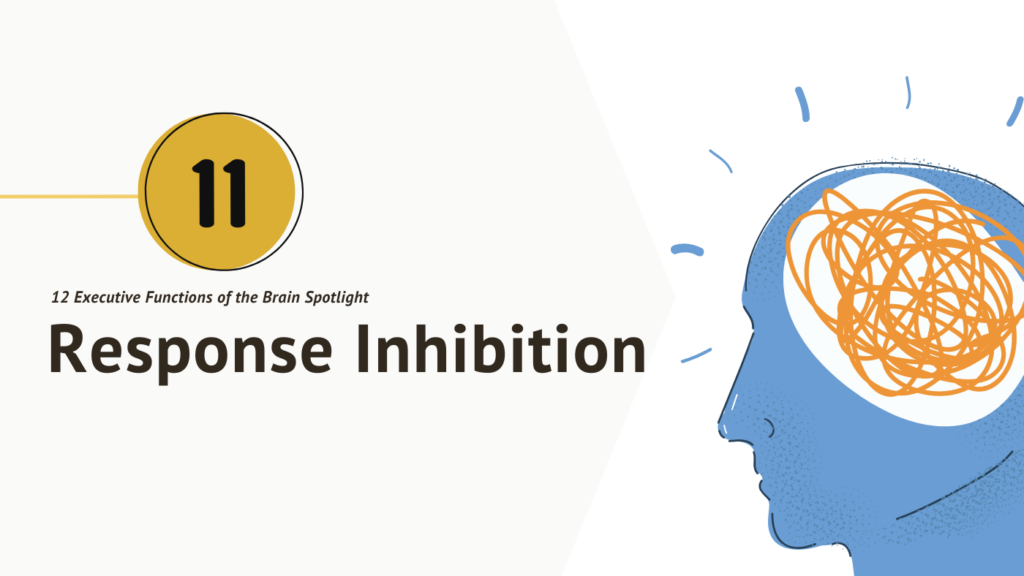Continuing with our series delving into the 12 Executive Function Skills of the Brain, I want to highlight one very challenging bugaboo for many, especially those with ADHD: the EF skill of “response inhibition” or “impulse control.” Russell Barkley uses the term “self-regulation.”
Those are all fancy terms for self-control.
Wondering if you struggle with response inhibition? Ask yourself: Is my brain able to control my behaviors so that they meet the expectations of those around me, or even my own expectations?
Examples of students showing self-control would be following classroom rules, not striking out at someone who ticks them off, and starting homework when they get home rather than starting to play a video game.
For adults, showing self-control looks like slowing down to follow the residential speed limit, not having the second or third cookie, and keeping your mouth shut to avoid saying something unnecessarily unkind or hurtful when you really feel like saying it.
Years ago, I watched a course titled: Scientific Secrets for Self-Control. Three key ideas from that course have stayed with me all these years.
1. Blame the Brain, not the Person
First, self-control is dependent on a lot of factors. It will vary depending on our metabolic energy. If we are tired or haven’t eaten well, self-control goes down. We now know that difficulty with self-control for those with ADHD is brain-based. It is not a character flaw.
2. How Badly Do You Want the Marshmallow?
The second key idea is that an important part of self-control is the ability to delay gratification. Our emotional brains are wired for desire. We want what we want, right now!
The famous longitudinal study that began with the Stanford Marshmallow Experiment looked at the importance of being able to delay gratification. The research said that if you have a capacity for delaying gratification, you will be healthier, have sustained positive long-term relationships, be financially stable and live longer. Who doesn’t want that?

3. Self-Control Struggles are Part of Being Human
The third big takeaway is that even for the best of us, research shows about 50% of the time we ALL fail at self-control! So, have some compassion for yourself and others. Self-control isn’t easy or automatic for us humans.
What CAN you do to improve self-control? Here are some of my favorite suggestions that I often share with Private Seeing My Time Clients.
- Focus on supporting your brain and body’s metabolic energy. Your brain NEEDS consistent exercise, adequate sleep and appropriate food. Eating some protein in the mid-afternoon will help with self-control by giving your brain a boost of energy until dinner time.
- Control the environment. Keep temptations out of sight. This means putting smartphones fully away and on silent while you need to focus on work. Keep ALL electronics out of bedrooms so they don’t interfere with getting enough sleep.
- Make choices based on your energy levels. Don’t go to the grocery store when you are hungry and tired. Those cookies, chips and ice cream will somehow magically appear in your cart, despite good intentions. If you don’t bring them home, then they aren’t a lure to eat excess calories.

- Accept your weak spots: Use external tools to help your self-control and understand that self-control diminishes as nighttime approaches because of lower metabolic energy.A personal side story: I finally had to accept that I could not stop myself from watching Korean dramas on Netflix. I would just keep watching way past my bedtime, which messed up my next day. My solution, which is very effective, was to subscribe to an internet app blocker. You can customize the times you aren’t allowed access to a whole range of apps. I started with Netflix and now adding my Kindle.
- For those with ADHD, medication can often be very helpful to improve self-regulation. It supports the inherently under-activated brain with both focus and self-control.
- Start building your ability to delay gratification. On your to-do list, be sure to put down activities that are rewarding for after you’ve crossed off some of the “have to’s.” Start your day with movement (a kinder word than exercise), going outside if possible. It will make your brain happier with more energy that is necessary for self-control.
- Be intentional with finances. If managing money is an issue, consider leaving credit and debit cards at home, and operating from a set amount of cash you budget for yourself. Build a savings habit by setting aside money each month in an account that isn’t easy to access. When you get a big enough stash, start investing for the long-term future. And it’s never too late to start. If you can’t get to the cash or credit card, you won’t spend it!
I hope you gained a few ideas about how to improve your executive functioning skill of response inhibition. In closing, I want you to have compassion for yourself when self-control evades you. It happens to all of us.
Little by little…we get better at self-control.


